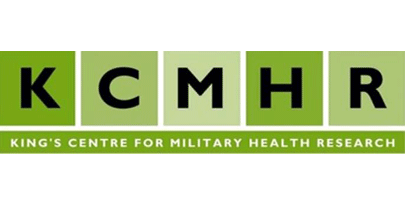Our Impact to date: King’s Centre for Military Health Research
Over the last 25 years our research has supported government policy making and informed provision of support services in the charity sector.
Our work has been used extensively to inform government policy on the mental health and wellbeing of serving and ex-serving personnel and their families. The 350+ research papers from the King’s Centre for Military Health Research (KCMHR) health & wellbeing cohort study collectively comprise a significant proportion of the evidence used to support top level policy making by the UK Ministry of Defence and the Office for Veterans’ Affairs on military mental health and wellbeing. It has further informed the charity sector in terms of their advocacy and service provision.
1. Our research identified 'surprising' offending patterns in military personnel.
It’s often reported that ex-serving personnel are ending up in prison. This can create stigma around those serving, bolstering the narrative sometimes used to describe personnel - that they are “mad, bad, and sad.” Using the first record linkage of its kind from military personnel records and national crime records, we showed that this is a myth, and that convictions and incarceration were substantially lower in the military group analysed than in the general population (1.7% versus 7.0%).
Our data did, however, draw attention to an exception – an increase in violent offending, particularly in younger age groups, which was directly linked to traumatic combat exposure and indirectly linked to alcohol misuse and post-traumatic stress disorder (PTSD). Hence this work both busted negative stereotypes whilst giving evidence as to which groups were most at risk of offending to inform intervention and support needed.
2. We provided evidence on the changing nature of help-seeking for mental health problems.
We assessed what the barriers were to seeking help in 1,450 military personnel and ex-service personnel who reported symptoms of mental health problems. We were able to show a steady increase in help-seeking over the lifetime of the cohort, such that in the latest data, 55% percent had accessed medical support, whilst 86% had used informal support (such as from family and friends), countering the popular belief that personnel are more reluctant than other groups to seek help.
However, there are still barriers to help-seeking, the most common one being the view that “I can or should be able to manage this myself.” For some, seeking help came only after reaching a crisis point. Having a strong social network that encourages help-seeking and the media’s increased discussions around mental health were positive influencers on decisions to seek support.
3. Our research helped to bust the myth that the absence of a parent through deployment created problems in their children.
KCMHR conducted the first systematic research on the impact of service on military families. We analysed potential adversities faced by military personnel and their families such as physical mobility, absence through deployments, threat of, and actual, physical injury and the psychological effects of deployment on service personnel. We studied the combined effects of these factors on spouses, partners and children’s mental health and wellbeing.
It had long been assumed, based on anecdotes, that frequent deployment of a parent, usually the father, was responsible in military families for causing children to experience emotional problems, or to have additional special educational needs. We provided the first evidence that this was untrue. Instead, difficulties found in children were linked to serious illness or injury of service personnel which had a profound impact on families, including poor mental health, relationship pressures, employment and financial pressures, and burden placed on children to support and provide care. We also found families had inconsistent knowledge and access to support services and we identified gaps in provision for military families.
4. We have evaluated how changes in policies being proposed by the Ministry of Defence affect mental health.
There has been debate about the use of screening to identify mental disorders following deployment – a practice which is routine in USA, Australia, and Canada, but has not been implemented in the UK due to our research. We first showed that pre-deployment screening carried out before deploying personnel to Iraq did not reduce post-deployment mental health problems. Instead, pre-deployment screening had unintended consequences for both individuals and the Armed Forces, particularly for “false positives”, i.e., where screening indicated service personnel at risk, who we then found did not go on to have any mental health problems.
However, the question of post-deployment screening, as practised by many nations, remained open. In 2017, KCMHR delivered the first ever cluster randomised controlled trial of post-deployment mental health screening anywhere on a large sample of UK Armed Forces personnel recently returned from combat deployment in Afghanistan. The study, funded by the US Department of Defence, found conclusively that screening did not improve mental health outcomes (depression, anxiety, PTSD, and alcohol misuse) and was also not effective at improving help-seeking.
5. We found that rates of PTSD in women in combat were no different to those in men which informed understanding of women in ground close combat.
The role of women in “ground close combat” (WGCC) has been much debated. One key to policy change is whether such roles would be associated with an unacceptable increase in psychiatric injury among women exposed to such duties. In 2017, KCMHR researched this question, including the impact of combat exposure and impact on help-seeking should the WGCC policy be implemented. The research concluded that rates of PTSD in women in combat roles was no different to those seen in men, and only minor changes to support requirements would be needed for women undertaking these type of combat roles.
